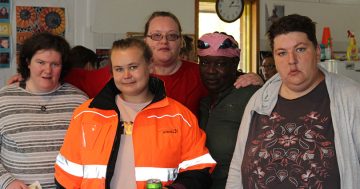
A report found access was the biggest issue facing OneLink, a central intake service for people experiencing homelessness in the ACT. Photo: File.
An independent report commissioned by the ACT Government has revealed “frustration” with the “diminished” performance of homelessness intake service OneLink.
Conducted by OCM, the investigation found a “very low” percentage of all clients referred to OneLink actually secured a successful referral to an accommodation or support service.
The data showed only 22.2 per cent of clients were connected to an accommodation service, while less than half (43.5 per cent) were referred to a support service between 2017 and 2021.
“The fact that there are so few concrete outcomes for clients is a source of frustration for clients, for people who work at OneLink and for service delivery organisations,” the report said.
“There are two main sources of this frustration, an overall lack of availability of services in the sector and a number of providers are refusing to actively participate in the system.”
Woden Community Services has been contracted by the Community Services Directorate to deliver OneLink since July 2016 until January 2023. It currently has 13 full-time staff.
About 2000 people accessed the service each year over the past four years, but the report found a number of services required under the contract had not been “substantively” delivered, including fostering shared practice tools across the sector, enhanced approaches to access the service, a 24/7 online self-service tool, reliable data collection and a quality improvement system.
“Overall, the delivery of contracted services has deteriorated across the life of the contract,” the report said.
The biggest issue appeared to be access, with an “overwhelming majority” of stakeholders expressing their dissatisfaction with OneLink’s performance in this regard.
“Many service delivery stakeholders expressed frustration with the quality of the OneLink service, reporting that they have ‘given up’ referring clients or engaging with the service,” the report said.
However it pointed out clients reported an “overwhelmingly positive” experience with OneLink’s frontline staff, saying they felt “safe and respected” regardless of service outcome.
“Other aspects of OneLink valued by stakeholders include the simplicity of a single point of referral, the outreach service and Woden Community Services’ ability to adapt quickly in the pandemic to deliver the client support fund,” the report noted.
“The limited supply of low-income rentals and shortage of social housing creates an environment where the central intake service will always be under pressure to deliver crisis homelessness services.”
This sentiment was echoed by ACT Council of Social Services (ACTCOSS) CEO Dr Emma Campbell.
She argued the only way you could effectively combat homelessness was by increasing the number of social and affordable housing options across the Territory.
“The number of public houses has decreased over the past ten years, but our population has increased by 20 per cent,” she said.
Dr Campbell also said more investment was needed in community housing providers and other sector services, so then there was actually somewhere to refer people to.
“If there are not enough appropriate services in the first place, organisations like OneLink face huge challenges in finding places for people experiencing homelessness to go,” she said.
“Outcomes for OneLink depend heavily on whether appropriate services are available, and often they aren’t, so they can’t achieve what they want to.”
The report was released alongside the ACT Homelessness Strategic Investment Plan, which was part of a commissioning process to plan for future homelessness service delivery and contract arrangements past 30 June 2023.
Stakeholder engagement and ‘deep dive’ discussions took place between January and June 2022 to identify gaps in services and identify needs with the aim to determine service changes needed to transition the sector into a ten-year funding model from July 2023.
Dr Campbell welcomed the stakeholder engagement that was part of this process but again stressed the housing crisis also needed to be addressed.
“While we welcome the genuine efforts from the ACT Government, much more work needs to be done,” she said.
“It’s highlighted where there are gaps, such as not enough places for women with children, a lack of culturally appropriate places for Aboriginal and Torres Strait Islander peoples, or people with substance abuse issues.
“But there aren’t enough houses to house them in the first place.”
Homelessness Minister Rebecca Vassarotti said she believed the plan would help make homelessness in the ACT a “rare, brief and non-recurring event”.
However, she admitted it would take time.
“But through genuine trust and co-design with those on the frontline of support and those with lived experience, we will fund initiatives that truly address the complexity of homelessness,” Ms Vassarotti said.
“The process to date has provided key insights around the whole system design as well as how to best deliver central planks such as the central intake service.”
She said feedback on OneLink showed there were keys areas which needed to be explored, but commended the service for its work, particularly during the height of the COVID-19 pandemic.
“OneLink did an extraordinary job during the lockdowns to provide accommodation to many Canberrans and families,” Ms Vassarotti said.
“At one point during lockdown, OneLink facilitated emergency hotel accommodation for more than 150 families in need.”
Ms Vassarotti said since the evaluation the Government had provided OneLink with additional support to address IT capability issues raised in the report.
A spokesperson from the Community Services Directorate said OneLink’s phone system had been upgraded to be a new call centre model in response to the report, and staff had been trained in the ICT infrastructure.
“It is important to acknowledge that, as with other homelessness services in the ACT, the central intake service (OneLink) is operating in a more challenging environment as the result of the pandemic, longer wait times for homelessness service vacancies due to lack of exit pathways, decreasing rental affordability and other cost of living pressures for clients seeking assistance,” they said.
“The OneLink report highlights key areas for further expansion of the service which will be explored through the commissioning co-design process with the sector, to further develop and deliver the best possible service in our homelessness landscape.”
The report outlined what a future central intake service could look like, including access through person-centred channels, a system which would enable common assessment across the sector, sector engagement and leadership appropriately resourced and underpinned by data, and governance and infrastructure to support effective management of risks and also enabled continuous improvement.
“For this model to be successful, it is critical that all funded services collaborate with the central intake service which is why the ACT Government is committed to working closely with all providers on the future of the central intake service,” the spokesperson said.
Woden Community Services said it was working closely with Housing ACT to keep refining the OneLink centralised intake model.
“We welcome the opportunities through the commissioning process to work with other service providers to best serve homeless people in the ACT,” a statement said.





















